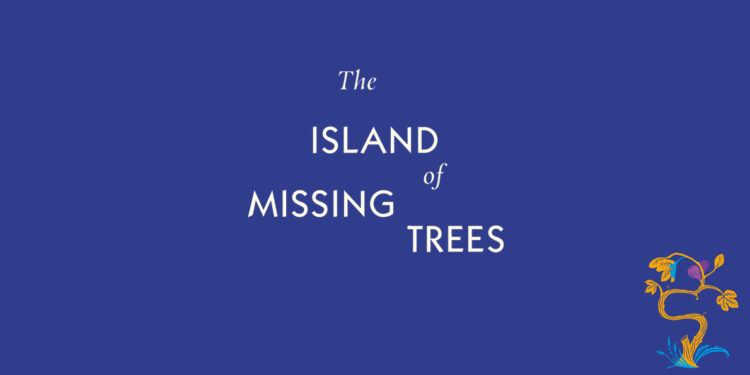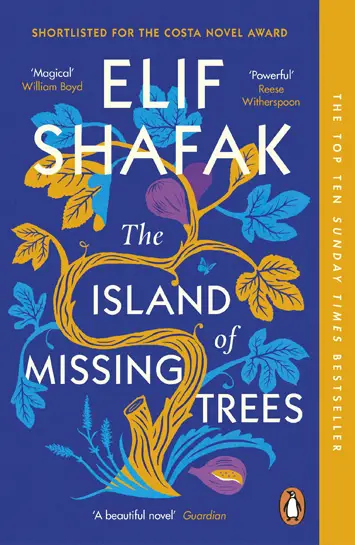The Island of Missing Trees by Elif Shafak – Review

By Richard Mansfield
Conflicts, born of prejudices, both present and historical, abound in our world and offer fertile emotional drama for novelists, especially when personal relationships develop across the boundaries of feuding religions and cultures. Britain’s colonial and post-colonial experiences around the globe provide numerous examples, both further afield and close to hand.
And so, in The Island Of Missing Trees, Elif Shafak’s focus, in another powerful novel, is on Cyprus which flared into an awful conflict during the 1970s. Associated with it came a diaspora of some of its citizens, both Greek and Turkish, Muslim and Christian, who came to Britain to find safety. For those of us of a certain age, the novel will bring recollection of a crisis that featured strongly in the international news of the time.
The narrative here alternates, both in time and locality, between the then strife-torn Cyprus and the comparably relative peace in London during the period from 1968 until the late 2010s.
At the heart of the story lies the relationship that develops, in Cyprus, between love-struck youngsters, Kostas and Defne, one Greek the other Turkish, who develop their clandestine and dangerous association across the divide – a divide viciously separating their own nationality and religion from the other by militant minorities. The setting, in which their necessarily discreet love develops, during the 1970’s, is at a taverna where their feelings flourish under the protective eyes of Yusuf and Yiorgis, the proprietors of ‘The Fig Tree’, themselves in a relationship that crosses the boundaries of not only nationality and religion, but also sexuality.
 Besides the various characters who populate and drive Defne and Kostas’s story, it is the fig tree, the one that shades the taverna, which acts as an observer and shares arboreal wisdom and comment upon what it witnesses across the years. Significantly it also offers environmental insights about the inter-relationships within the biodiversity of our natural world. Indeed the tree is the avenue to Shafak sharing her considerable knowledge of, and empathy for, the flora and fauna of the planet. This contributes to the lyricism in which her writing is so grounded.
Besides the various characters who populate and drive Defne and Kostas’s story, it is the fig tree, the one that shades the taverna, which acts as an observer and shares arboreal wisdom and comment upon what it witnesses across the years. Significantly it also offers environmental insights about the inter-relationships within the biodiversity of our natural world. Indeed the tree is the avenue to Shafak sharing her considerable knowledge of, and empathy for, the flora and fauna of the planet. This contributes to the lyricism in which her writing is so grounded.
“Sometimes startling”
Inevitably there is the heartache of separation; Defne remains in Cyprus and Kostas flees to London. Thereafter, as in any good novel, the ensuing story has twists and turns, some poignant, some coming like hammer-blows to the reader’s emotions, but always informed by the author’s knowledge and empathies. Fortunately the story is leavened with some humour by the developing relationship between a troubled teenager and an eccentric aunt, the latter’s arrival being much resented by the former. To say more about how things unfold would be to spoil potential readers’ enjoyment, though the narrative, of course, is one that cannot be wholly anticipated from its outset.
At points the observations attributed to the fig tree may become overdone, sentimentalised perhaps, leaving the reader to speculate that they are following something that is intended to be a fable.
The author’s research grounds the story and this gives the book a very strong sense of realism. This is outlined in the ‘Note to the Reader’ at the end, for example reference to the work done by the Committee for Missing Persons.
Having read a previous novel by Shafak, this now being her twelfth, the things that stand out are her empathy, humanity, lyricism and appreciation of the natural world. In The Island of Missing Trees, perhaps we can appreciate the arboreal world more as one where trees can teach us of more things than simply their age, as revealed within their rings, as things to be cherished. The metaphors employed in this novel are sometimes beautiful and sometimes startling, very rarely are they jarring or misplaced.
We learn a lot in this book, especially how, as human beings, we hide important things from those close to us, baggage that is better shared, no matter how heavily it may weigh.
This book will surely further enhance Elif Shafak’s reputation.
The Island of Missing Trees by Elif Shafak is published by Viking, £14.99 hardback









